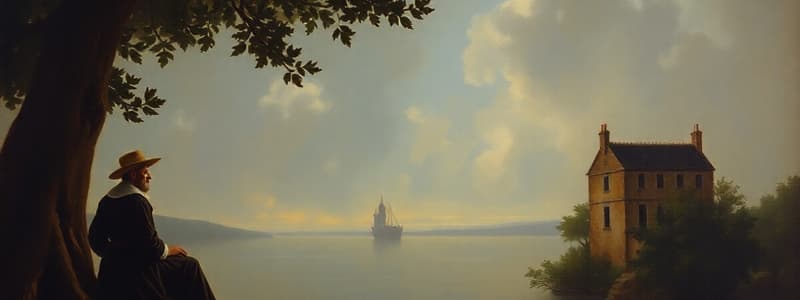Podcast
Questions and Answers
Which philosopher is known for advocating gradual, evolutionary change rather than a revolutionary approach?
Which philosopher is known for advocating gradual, evolutionary change rather than a revolutionary approach?
- Friedrich Hayek
- Edmund Burke (correct)
- John Locke
- Thomas Hobbes
What concept did Hobbes refer to as necessary for preventing anarchy?
What concept did Hobbes refer to as necessary for preventing anarchy?
- Natural Rights
- Civil Disobedience
- The Social Contract
- The Leviathan (correct)
How did Oakeshott's perception of human nature influence his conservative views?
How did Oakeshott's perception of human nature influence his conservative views?
- He believed humans are inherently rational and predictable.
- He thought humans are driven solely by economic motives.
- He proposed that humans are naturally cooperative.
- He considered humans as fallible and unpredictable. (correct)
What is Rand's stance regarding capitalism?
What is Rand's stance regarding capitalism?
What aspect of libertarian conservatism is associated with Nozick?
What aspect of libertarian conservatism is associated with Nozick?
What do Burke's 'little platoons' signify in the context of conservatism?
What do Burke's 'little platoons' signify in the context of conservatism?
What unifying idea is found in the philosophies of Hobbes, Burke, and Oakeshott?
What unifying idea is found in the philosophies of Hobbes, Burke, and Oakeshott?
According to Burke, what role do traditions play in society?
According to Burke, what role do traditions play in society?
Which political ideology stresses minimal state involvement in citizens' lives?
Which political ideology stresses minimal state involvement in citizens' lives?
In what way did Oakeshott's conservatism diverge from radical ideologies?
In what way did Oakeshott's conservatism diverge from radical ideologies?
What aspect of human nature did Thomas Hobbes emphasize as a reason for needing a strong authority?
What aspect of human nature did Thomas Hobbes emphasize as a reason for needing a strong authority?
What did Edmund Burke believe was essential for maintaining social stability?
What did Edmund Burke believe was essential for maintaining social stability?
According to Michael Oakeshott, what should be prioritized over idealistic political schemes?
According to Michael Oakeshott, what should be prioritized over idealistic political schemes?
What was Ayn Rand's perspective on welfare and state intervention?
What was Ayn Rand's perspective on welfare and state intervention?
What central belief does Robert Nozick's entitlement theory of justice advocate?
What central belief does Robert Nozick's entitlement theory of justice advocate?
How did Hobbes define the 'state of nature'?
How did Hobbes define the 'state of nature'?
What was one of the reasons why Burke rejected the French Revolution?
What was one of the reasons why Burke rejected the French Revolution?
What did Nozick argue about redistributive taxation?
What did Nozick argue about redistributive taxation?
What philosophy did Ayn Rand advocate regarding individual rights?
What philosophy did Ayn Rand advocate regarding individual rights?
What was Michael Oakeshott's critique related to rationalism in politics?
What was Michael Oakeshott's critique related to rationalism in politics?
Flashcards
Burke's view on change
Burke's view on change
Gradual, evolutionary change over revolutionary upheaval.
Hobbes' Leviathan
Hobbes' Leviathan
A strong ruler needed for a peaceful society.
Oakeshott's human nature
Oakeshott's human nature
Humans are flawed; need cautious rules.
Rand's view on capitalism
Rand's view on capitalism
Signup and view all the flashcards
Nozick's view on the State
Nozick's view on the State
Signup and view all the flashcards
Burke's 'little platoons'
Burke's 'little platoons'
Signup and view all the flashcards
Common thread in Hobbes, Burke, Oakeshott
Common thread in Hobbes, Burke, Oakeshott
Signup and view all the flashcards
Gradual change
Gradual change
Signup and view all the flashcards
Revolutionary upheaval
Revolutionary upheaval
Signup and view all the flashcards
Individual freedom
Individual freedom
Signup and view all the flashcards
Hobbes' view of human nature
Hobbes' view of human nature
Signup and view all the flashcards
Hobbes' state of nature
Hobbes' state of nature
Signup and view all the flashcards
Burke's view of society
Burke's view of society
Signup and view all the flashcards
Burke's view on French Revolution
Burke's view on French Revolution
Signup and view all the flashcards
Oakeshott's political view
Oakeshott's political view
Signup and view all the flashcards
Oakeshott's rationalism
Oakeshott's rationalism
Signup and view all the flashcards
Rand's Objectivism
Rand's Objectivism
Signup and view all the flashcards
Nozick on redistributive taxation
Nozick on redistributive taxation
Signup and view all the flashcards
Nozick's entitlement theory
Nozick's entitlement theory
Signup and view all the flashcards
Study Notes
Core Conservative Thinkers and Their Ideas
- Hobbes' view of human nature: Humans are naturally selfish, competitive, and prone to conflict. This requires a strong authority to maintain order.
- Hobbes' "state of nature": A hypothetical state where life without authority is "nasty, brutish, and short."
- Purpose of the state (Hobbes): To impose order and prevent chaos through a social contract where individuals surrender some freedom for security.
- Burke's contribution to conservatism: Emphasized tradition, gradual change, respect for established institutions, and social stability.
- Burke's view of society: An organic entity evolving over time, binding generations through tradition and shared values.
- Burke's rejection of the French Revolution: Opposed its radical rejection of tradition and violent pursuit of abstract principles like equality.
- Oakeshott's idea about politics: Politics should focus on pragmatic governance, preferring familiarity and tradition over idealistic schemes.
- Oakeshott's "rationalism in politics": Critiqued attempts to design society through abstract theories, arguing practical knowledge is more important.
- Ayn Rand's objectivism: Emphasized rational self-interest, individual freedom, and a limited state to protect property rights and personal liberty.
- Rand's view on welfare and state intervention: Opposed welfare and state intervention, arguing they undermine individual responsibility and freedom.
- Nozick's view on the state: Advocated for a minimal state focused solely on protecting individual rights like property and personal safety.
- Nozick's rejection of redistributive taxation: Argued it violates individual liberty by forcing individuals to give up earnings they are entitled to.
- Nozick's entitlement theory of justice: Justice arises when individuals acquire property through fair means and voluntary exchange.
- Burke's concept of change: Supported gradual evolutionary change rather than revolutionary upheaval.
- Hobbes' "Leviathan": A powerful state or sovereign authority necessary to prevent anarchy and ensure peace.
- Oakeshott's view of human nature: Saw humans as fallible and unpredictable, requiring cautious governance and stability.
- Rand's view on capitalism: Viewed it as the only moral system because it respects individual freedom and rewards effort and talent.
- Nozick's association with libertarian conservatism: Stressed the importance of personal liberty, a free market, and minimal state involvement in people's lives.
- Burke's "little platoons": Reflects the importance of local communities and institutions in maintaining social stability and nurturing values.
- Common thread in Hobbes, Burke, and Oakeshott: All stressed the importance of authority, tradition, and pragmatism in maintaining societal order.
Studying That Suits You
Use AI to generate personalized quizzes and flashcards to suit your learning preferences.




